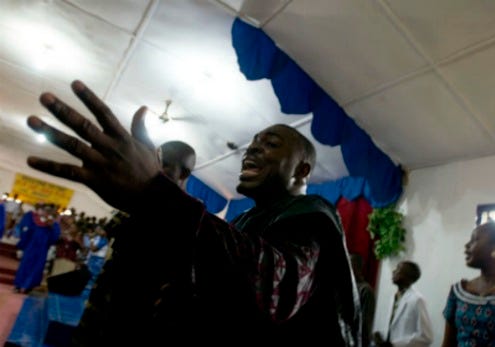The Redemption of General Butt Naked

For showtimes and more information, click here.
Don't be fooled by the silly title. This movie is deadly serious, a powerful film that you're not likely to forget.
"The Redemption of General Butt Naked" is a film about religion, civil war and cruelty that explores the idea of redemption as a concept.
"General Butt Naked" is, for all intents and purposes, the stage name of Joshua Milton Blahyi, the leader of the "Butt Naked" tribe who terrorized West Africa during a civil war that killed more than 250,000 people. They were named as such because they went into battle completely nude, believing that voodoo gave them mystical powers
After the war ended, Blahyi became a Christian minister and a public figure. In one life, he was a cruel human being who committed unspeakable acts, killed for the enjoyment of it all and one who, according to Christianity, is forgiven for his many horrible sins because he recited a prayer and now preaches the gospel.
We see Blahyi looking to atone for his past, visiting the sister of a man he killed during the war, apologizing and offering to be a brother to her, to offer her "brotherly advice." It rings hollow, as if he's trying to assuage his own guilt rather than trying to help someone.
We meet his former bodyguard, whom Blahyi recruited as a child, who now, after the war, has no legs and begs for money. He lost his legs when Blahyi, convinced his bodyguard was lying to him, shot him in the legs and locked him in a bathroom for a week.
Blahyi visits his former soldiers in a crackhouse and talks about how he forced them to fight as child soldiers, then discusses how he felt child soldiers were more effective than adults because they hadn't yet started to think about their future. He could also trick them by showing them Hollywood action movies, then showing the people who died in one movie alive again in another movie. His message: People who are killed will live on in another movie.
But he is a charismatic man who can, with just a few words, talk the man whose legs he took into forgiving him and bring many of the boys he kidnapped and forced into killing into his church.
When Liberia creates a Truth and Reconciliation Commission to investigate crimes during the war, Blahyi begins to worry that the TRC is targeting him. His followers, tears in their eyes, tell him that they have no other family (though Blahyi himself may have taken them from their families).
When he is called before the TRC, he confesses to being directly responsible for the deaths of 20,000 civilians and says he wants to make amends. But can he? Does he really want to or does he just want to skirt the responsibility?
What happens is equally shocking and utterly expected, exploring the nature of redemption and the question of at what point can you come back because surely if he can be redeemed, anyone can.
Or can they? Perhaps General Butt Naked is not dead or even dormant and is trying to cover his own tracks?
The tells are there, subtly displayed by the placement of his arms at a certain moment. But directors Daniele Anastation and Eric Strauss don't force their opinions on the viewer, instead allowing them to form their own assessments.
It's a brilliant stroke that pays off well in a tremendous film, an important film that gives insights into human nature, the notion of forgiveness and the power of words and actions.


